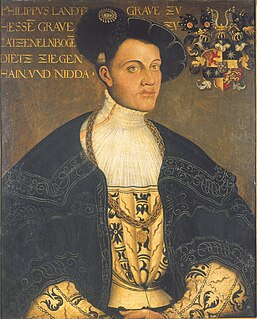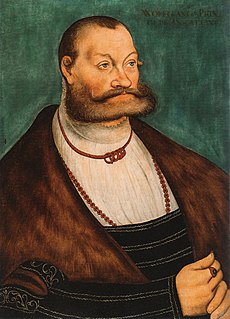Diet of Speyer or Diet of Spires refers to any of the sessions of the imperial diets of the Holy Roman Empire, of which 50 took place between 838 and 1570 in the city of Speyer (Spires), now in Germany. The most famous sessions occurred in 1526 and 1529.
An incomplete lists of Diets of Speyer includes:
The Diets of Nuremberg, also called the Imperial Diets of Nuremberg, took place at different times between the Middle Ages and the 17th century.

Speyer is a city in Rhineland-Palatinate in Germany with approximately 50,000 inhabitants. Located on the left bank of the river Rhine, Speyer lies 25 km south of Ludwigshafen and Mannheim, and 21 km south-west of Heidelberg. Founded by the Romans, it is one of Germany's oldest cities. Speyer Cathedral, a number of other churches, and the Altpörtel dominate the Speyer landscape. In the cathedral, beneath the high altar, are the tombs of eight Holy Roman Emperors and German kings.

Philip I, Landgrave of Hesse, nicknamed der Großmütige, was a champion of the Protestant Reformation and one of the most important of the early Protestant rulers in Germany.

Johann Cochlaeus (Cochläus) was a German humanist, music theorist, and controversialist.

The Schmalkaldic War refers to the short period of violence from 1546 until 1547 between the forces of Emperor Charles V of the Holy Roman Empire, commanded by the Duke of Alba and the Duke of Saxony, and the Lutheran Schmalkaldic League within the domains of the Holy Roman Empire.

The Diet of Augsburg were the meetings of the Imperial Diet of the Holy Roman Empire held in the German city of Augsburg. Both an Imperial City and the residence of the Augsburg prince-bishops, the town had hosted the Estates in many such sessions since the 10th century. In 1282, the diet of Augsburg assigned the control of Austria to the House of Habsburg. In the 16th century, twelve of thirty-five imperial diets were held in Augsburg, a result of the close financial relationship between the Augsburg-based banking families such as the Fugger and the reigning Habsburg emperors, particularly Maximilian I and his grandson Charles V. Nevertheless, the meetings of 1518, 1530, 1547/48 and 1555, during the Reformation and the ensuing religious war between the Catholic emperor and the Protestant Schmalkaldic League, are especially noteworthy.

JacobSturm von Sturmeck was a German statesman, one of the preeminent promoters of the Protestant Reformation in Germany.

On April 19, 1529, six princes and representatives of 14 Imperial Free Cities petitioned the Imperial Diet at Speyer against an imperial ban of Martin Luther, as well as the proscription of his works and teachings, and called for the unhindered spread of the evangelical faith.
The Diet of Speyer or the Diet of Spires was a Diet of the Holy Roman Empire held in 1529 in the Imperial City of Speyer. The Diet condemned the results of the Diet of Speyer of 1526 and prohibited future reformation. It resulted in the Protestation at Speyer.
The Diet of Speyer or the Diet of Spires was an Imperial Diet of the Holy Roman Empire in 1526 in the Imperial City of Speyer in present-day Germany. The Diet's ambiguous edict resulted in a temporary suspension of the Edict of Worms and aided the expansion of Protestantism. Those results were repudiated in the Diet of Speyer (1529).
The League of Torgau was an alliance of Lutheran princes, including Philip of Hesse and John of Saxony, which was formed 27 February 1526 to oppose the terms set forth in the Edict of Worms. Because it had no substantial military, it was unable to achieve religious or political influence. In 1531, the Schmalkaldic League, a similar alliance that included an army of 10,000 infantry and 2,000 cavalry, was formed. It lasted for sixteen years and was more successful in reaching its demands. The League of Torgau was set up soon after the 1526 Imperial Diet of Speyer.

The Eastern Hungarian Kingdom is a modern term coined by historians to designate the realm of John Zápolya and his son John Sigismund Zápolya, who contested the claims of the House of Habsburg to rule the Kingdom of Hungary from 1526 to 1570. The Zápolyas ruled over an eastern part of Hungary, and the Habsburg kings ruled the west. The Habsburgs tried several times to unite all Hungary under their rule, but the Ottoman Empire prevented that by supporting the Eastern Hungarian Kingdom.

Wolfgang, Prince of Anhalt-Köthen, was a German prince of the House of Ascania and ruler of the principality of Anhalt-Köthen. He was one of the earliest Protestant rulers in the Holy Roman Empire.
Diet of Regensburg may refer any of the sessions of the Imperial Diet, Imperial States, or the prince-electors of the Holy Roman Empire which took place in the Imperial City of Regensburg (Ratisbon), now in Germany.

Johann, known as Johann the Steadfast or Johann the Constant, was Elector of Saxony from 1525 until 1532 from the House of Wettin.

George I of Pomerania was a Duke of Pomerania from the House of Griffins.
The term Treaty of Speyer or Treaty of Spires refers to any of several treaties signed in the city of Speyer (Spires), now in Germany:
The Diet of Speyer or the Diet of Spires was an Imperial Diet of the Holy Roman Empire which took place in 1570 in the Imperial City of Speyer.
The Treaty of Speyer, signed at the Diet of Speyer in 1570, was a peace agreement between the two Hungarian Kingdoms, Royal Hungary led by Maximilian II, and the Eastern Hungarian Kingdom, ruled by John Sigismund Zápolya.
Diet of Frankfurt may refer any of the sessions of the Imperial Diet, Imperial States, or the prince-electors of the Holy Roman Empire which took place in the Imperial City of Frankfurt.